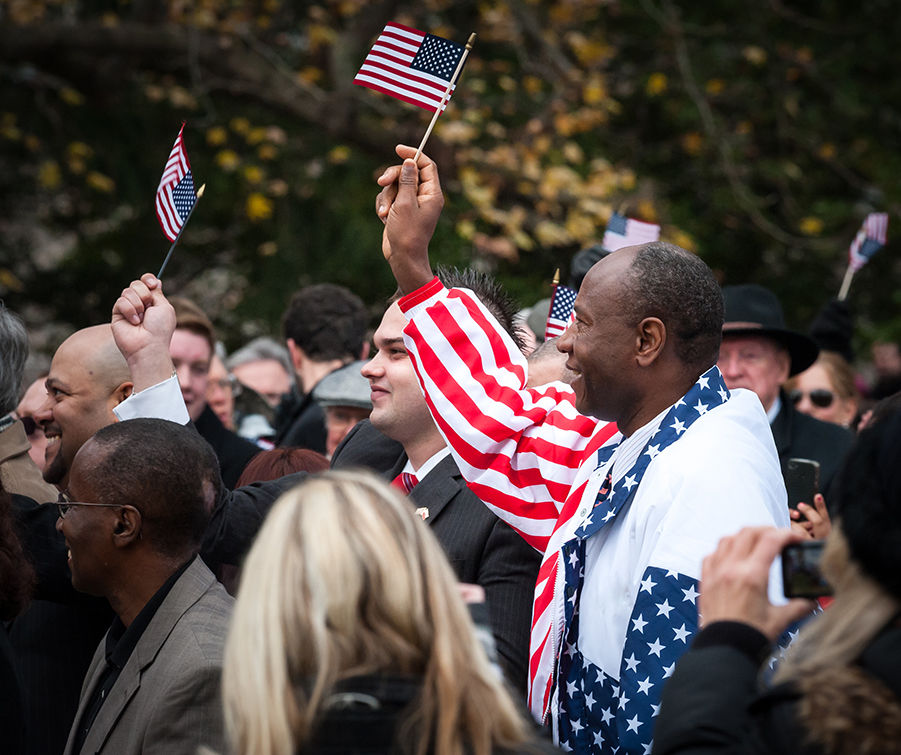I thought for the 4th of July I’d attend a U.S. naturalization ceremony.
These take place regularly in the Los Angeles area and are open to the public.
So on June 20, a bit before 9 a.m., I showed up at the Pasadena Convention Center. I had trouble finding parking and ended up next to St. Andrew Church on Raymond Avenue and sprinting the several blocks.
Everyone else had arrived an hour early so I was the only person in the airport-type security line. Inside, I found what looked to be the one remaining seat, in the uppermost row, beside a lovely man from India whose wife was being sworn in.
Looking around my immediate vicinity, I saw only one other Caucasian face.
On the stage were three tables, draped with bunting. “Celebrate citizenship, celebrate America” read a large screen. We heard “The Star-Spangled Banner” set to a jaunty military march.
Then a judge swept onto the stage, banged her gavel and announced that court was in session. Under Section 337 of the Immigration and Nationality Act, 967 people were about to be sworn in.
I registered scattered phrases. “I hereby declare, on oath, that I absolutely and entirely renounce and abjure all allegiance and fidelity to any foreign prince, potentate, state or sovereignty … that I will bear arms on behalf of the United States when required by the law … that I will perform work of national importance under civilian direction when required by the law … without any mental reservation or purpose of evasion …”
Here my mind wandered and I began devising my own oath:
I swear to plant a tree each year.
I swear to hang a bird feeder outside my window.
I swear to bake a cake for my next door neighbor.
I swear to return my library books on time.
I swear to set aside time daily to praise the morning and to ponder the stars …
Next thing I knew, the judge and four officials were waving miniature flags and we were all heartily applauding the new citizens as the judge said, “This is the only thing we get to do where everyone leaves happy.”
Then she delivered some remarks, during which my mind again wandered. “Demonstrate good character and morals.” “It’s often the case that that which we have to work for we value more.” “Freedom, opportunity, equality, justice and the right to participate in a democracy.” “There is no more honorable calling than the armed services.” “People like you make the country what it is.”
I thought of ICE (Immigration and Customs Enforcement), the second-largest criminal investigative agency in the U.S. government after the FBI — and probably the most feared organization in L.A. County.
Nancy Alby, L.A. field office director for U.S. Citizenship and Immigration Services, chimed in as well. More catchwords: pride, strength, diversity. She gave a shout-out to other naturalized citizens who had managed to make themselves useful: Albert Einstein, Madeleine Albright.
We learned that 87 countries were represented and that the five with the largest number of new citizens, in ascending order, were Guatemala, El Salvador (big cheer), China, the Philippines and Mexico.
We were treated to a music video of “America the Beautiful,” sung against a backdrop of Mt. Rushmore. Solomon Henderson delivered a heartfelt rendition of “The Star-Spangled Banner.”
Then the half-hour ceremony was over and the people in charge were saying, in so many words, “Get out and make it snappy.”
Well-wishers thronged the plaza afterward: parents, spouses, children and friends waiting for the newly sworn in to emerge. It was impossible not to be moved. I thought of my paternal grandparents who had come over on a boat from Ireland in the early 1900s. “Welcome!” I wanted to shout. I wished I could sit down with each of the 967 people who had just been sworn in and hear his or her story.
All the way back to my car, I thought how lucky I was to have been born, formed and come into the Church in this country I love so much.
At St. Andrew, I felt inexplicably moved to duck into the sanctuary. Maybe because countries, like the Church, are often referred to as “she,” I found myself before a statue of the Pietà. Kneeling, I contemplated Mary: her head lain tenderly over the Son of Man who called Jerusalem home, but had nowhere to lay his own head. Rows of candles flickered in the dim light. Across the way, an elderly Latina droned the rosary.
“We are citizens of heaven,” said St. Paul.
Or as French Catholic poet Charles Péguy observed, “We must all be saved together! Reach God together! Appear before Him together! We must return to our Father’s house together. … What would He think if we arrived without the others, without the others returning, too?”
Heather King is a blogger, speaker and the author of several books.

